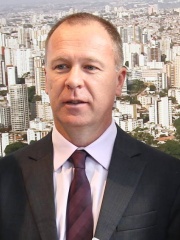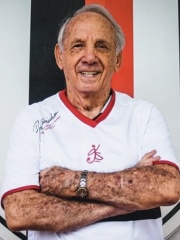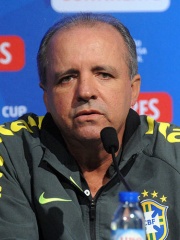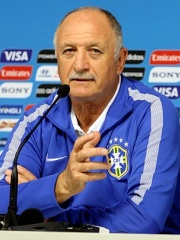
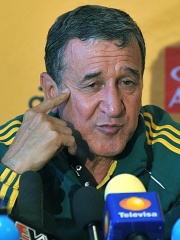
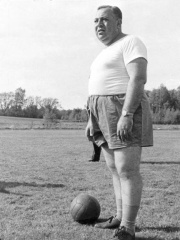
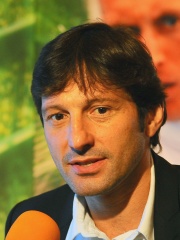
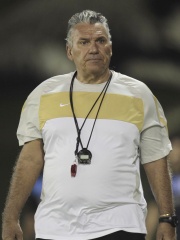
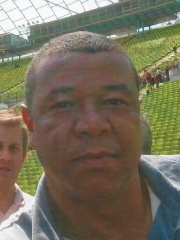
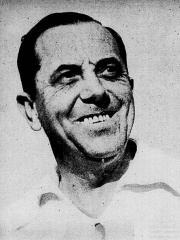

The Most Famous
COACHES from Brazil
Top 10
The following people are considered by Pantheon to be the top 10 most legendary Brazilian Coaches of all time. This list of famous Brazilian Coaches is sorted by HPI (Historical Popularity Index), a metric that aggregates information on a biography's online popularity. Visit the rankings page to view the entire list of Brazilian Coaches.

1. Luiz Felipe Scolari (b. 1948)
With an HPI of 74.40, Luiz Felipe Scolari is the most famous Brazilian Coach. His biography has been translated into 58 different languages on wikipedia.
Luiz Felipe Scolari (Brazilian Portuguese: [luˈis feˈlipi skoˈlaɾi, - fiˈ-]; born 9 November 1948), also known as Felipão ("Big Phil"), is a Brazilian football manager and former player who currently serves as the technical director of Grêmio. Considered to be one of the greatest and most successful managers of all time by several pundits, Scolari was a defender during his playing days, and notably represented Caxias before moving to a managerial role in 1982. After leading the Brazil national team to a FIFA World Cup win in 2002, he was manager of the Portugal national team from July 2003 to June 2008. He led Portugal to the final of UEFA Euro 2004, which they lost 0–1 to Greece, and to a fourth-place finish in the 2006 World Cup. Scolari also managed Portugal through UEFA Euro 2008, but resigned after a 2–3 loss to Germany in the second round. After a return to club management at Chelsea in the Premier League, Scolari was hired again as manager of the Brazil national team in 2012. He led them to victory at the 2013 Confederations Cup, and to the semi-final in the 2014 World Cup. After the Brazil national team finished fourth overall in an upset 1–7 loss to Germany in the semi-finals, and a 0–3 loss to the Netherlands in the third-place playoff, the Brazilian Football Confederation decided not to renew his contract. In 2015, he started work at Guangzhou Evergrande and went on to claim both the 2015 Chinese Super League and 2015 AFC Champions League in his first season with the club. He returned to Palmeiras in 2018, winning his second Brazilian league title that year. Scolari is a dual citizen of Brazil and Italy, as he is descended from Italian immigrants.

2. Carlos Alberto Parreira (b. 1943)
With an HPI of 72.47, Carlos Alberto Parreira is the 2nd most famous Brazilian Coach. His biography has been translated into 46 different languages.
Carlos Alberto Gomes Parreira (born 27 February 1943) is a Brazilian former football manager who holds the record for attending the most FIFA World Cup final tournaments as manager with six appearances. He also managed five different national teams in five editions of the FIFA World Cup. He managed Brazil to victory at the 1994 World Cup, the 2004 Copa América, and the 2005 Confederations Cup. He is also the only manager to have led two different Asian teams to conquer the AFC Asian Cup. He last managed the South Africa national football team. Parreira is one of the most successful managers to have never played football himself.

3. Vicente Feola (1909 - 1975)
With an HPI of 66.88, Vicente Feola is the 3rd most famous Brazilian Coach. His biography has been translated into 29 different languages.
Vicente Ítalo Feola (pronounced [ˈfɛːola]; 20 November 1909 – 6 November 1975) was a Brazilian football manager and coach from São Paulo. He is best known for leading the Brazil national team to its first FIFA World Cup title in 1958.

4. Leonardo Araújo (b. 1969)
With an HPI of 65.61, Leonardo Araújo is the 4th most famous Brazilian Coach. His biography has been translated into 62 different languages.
Leonardo Nascimento de Araújo (born 5 September 1969), known as Leonardo Araújo or simply Leonardo, is a Brazilian football executive and former player and manager. He last served as the sporting director of Ligue 1 club Paris Saint-Germain from 2019 to 2022. A versatile player, Leonardo was employed in several positions throughout his career, including as an attacking midfielder, left winger, and left-back; his best-known and most successful period was at AC Milan, in the role of attacking midfielder (or trequartista) behind the forwards. He played for teams in Brazil, Spain, Japan, France and Italy, winning titles with Flamengo, São Paulo, Kashima Antlers and Milan. A former Brazil international, Leonardo played in the 1994 World Cup winning side, as well as the team that finished runners-up in the 1998 edition of the tournament. He also represented his nation in two Copa América tournaments, reaching the final in 1995, and winning the title in 1997, also claiming the FIFA Confederations Cup in the same year. Following his retirement, Leonardo also served as a coach for Italian side Milan, and successively as coach of crosstown rivals Inter Milan, where he won a Coppa Italia title in 2011. From 2011 to 2013, he was sporting director of his former club Paris Saint-Germain (PSG). He coached Antalyaspor in 2017 before returning to Milan as sporting director in 2018. In 2019, Leonardo returned to PSG as sporting director, until he was sacked in 2022.
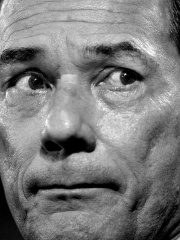
5. Vanderlei Luxemburgo (b. 1952)
With an HPI of 64.36, Vanderlei Luxemburgo is the 5th most famous Brazilian Coach. His biography has been translated into 34 different languages.
Vanderlei Luxemburgo da Silva (born 10 May 1952) is a retired former Brazilian professional football coach and player. A left wingback, Luxemburgo represented Flamengo, Internacional and Botafogo before retiring in 1980. He subsequently became a coach and led Palmeiras, Corinthians, Cruzeiro and Santos to Série A titles, winning the tournament five times, a record total. In 2005 he worked at Real Madrid, but was dismissed in December of that year. His surname is named after revolutionary Rosa Luxemburg.

6. Sebastião Lazaroni (b. 1950)
With an HPI of 63.01, Sebastião Lazaroni is the 6th most famous Brazilian Coach. His biography has been translated into 30 different languages.
Sebastião Barroso Lazaroni, (born 25 September 1950) is a Brazilian football manager who last coached Qatar Stars League club Qatar SC. He was born in Muriaé, Minas Gerais state. He is well known in Brazil as the manager who tried to introduce the libero position in Brazilian football. He used the 3–5–2 scheme during the 1990 FIFA World Cup, but it was a failure, and Brazil was eliminated in the second round by Argentina. When he was the Brazil national team head coach, in 35 matches, he won 21, drew seven and lost seven. He helped Brazil win the South American Championship in 1989, the team's first Copa América title in 39 years. He is also known for his being the head coach of Turkish club Fenerbahçe that ended the 40-year undefeated European home record of Manchester United in the UEFA Champions' League match in 1996. He took over the Qatar national team on 1 August 2011 as a replacement for Milovan Rajevac, but was ultimately fired four months later as a result of the team's unimpressive performances. The QFA highlighted his failure to advance past the group stage of the 2011 Pan Arab Games, which Qatar had hosted, as a main cause of his sacking. His record with the team ended with two wins, five draws and two losses. He was officially sacked on 3 January 2012 after his contract was released by QFA. Lazaroni was last in charge of Qatar SC for the third time in his career following spells with the Doha based club between 2008 and 2011 and 2012 and 2014. His third spell ended in disappointment and he was dismissed in May 2016 after the club's relegation from Qatar Stars League.

7. Mazinho (b. 1966)
With an HPI of 62.32, Mazinho is the 7th most famous Brazilian Coach. His biography has been translated into 35 different languages.
Iomar do Nascimento (born 8 April 1966), known as Mazinho, is a Brazilian football manager and former player. Mazinho played primarily as a defensive midfielder and a full-back in his professional playing career. As a manager, he had a short spell at Greek club Aris in 2009. A former central midfielder, Mazinho played 35 internationals for Brazil national team, winning the 1989 Copa América, 1994 FIFA World Cup and the silver medal at the 1988 Olympics. He was also named in the squads for the 1990 World Cup and 1991 Copa América.

8. Adhemar Pimenta (1896 - 1970)
With an HPI of 58.80, Adhemar Pimenta is the 8th most famous Brazilian Coach. Her biography has been translated into 17 different languages.
Adhemar Pimenta (1896-1970) was a Brazilian football manager. He was born in Rio de Janeiro on April 12, 1896, and died in the same city on August 26, 1970.

9. Zé Mário (b. 1949)
With an HPI of 58.29, Zé Mário is the 9th most famous Brazilian Coach. His biography has been translated into 24 different languages.
José Mário de Almeida Barros, (born 1 February 1949), commonly known as Zé Mário, is a Brazilian football manager and former player. He formerly coached the Al-Arabi Sports Club in Qatar.

10. José Faria (1933 - 2013)
With an HPI of 57.83, José Faria is the 10th most famous Brazilian Coach. His biography has been translated into 16 different languages.
José 'Mehdi' Faria (April 26, 1933 – October 8, 2013) was a Brazilian football coach. He coached Morocco in the 1986 FIFA World Cup, when they became the first African team to advance to the second round. He converted to Islam when coaching Morocco.
People
Pantheon has 38 people classified as Brazilian coaches born between 1896 and 1989. Of these 38, 27 (71.05%) of them are still alive today. The most famous living Brazilian coaches include Luiz Felipe Scolari, Carlos Alberto Parreira, and Leonardo Araújo. The most famous deceased Brazilian coaches include Vicente Feola, Adhemar Pimenta, and José Faria.
Living Brazilian Coaches
Go to all RankingsLuiz Felipe Scolari
1948 - Present
HPI: 74.40
Carlos Alberto Parreira
1943 - Present
HPI: 72.47
Leonardo Araújo
1969 - Present
HPI: 65.61
Vanderlei Luxemburgo
1952 - Present
HPI: 64.36
Sebastião Lazaroni
1950 - Present
HPI: 63.01
Mazinho
1966 - Present
HPI: 62.32
Zé Mário
1949 - Present
HPI: 58.29
Oswaldo de Oliveira
1950 - Present
HPI: 57.15
Mano Menezes
1962 - Present
HPI: 56.83
Valdeir Vieira
1944 - Present
HPI: 56.35
Edson Tavares
1956 - Present
HPI: 56.18
Betinho
1966 - Present
HPI: 55.04
Deceased Brazilian Coaches
Go to all RankingsVicente Feola
1909 - 1975
HPI: 66.88
Adhemar Pimenta
1896 - 1970
HPI: 58.80
José Faria
1933 - 2013
HPI: 57.83
Cláudio Coutinho
1939 - 1981
HPI: 56.22
Antoninho
1939 - 2021
HPI: 55.75
Valmir Louruz
1944 - 2015
HPI: 55.36
Lori Sandri
1949 - 2014
HPI: 54.95
Paulo Emilio
1936 - 2016
HPI: 54.53
Nicanor de Carvalho
1947 - 2018
HPI: 53.00
Vadão
1956 - 2020
HPI: 50.12
Otacílio Gonçalves
1940 - 2025
HPI: 49.72
Overlapping Lives
Which Coaches were alive at the same time? This visualization shows the lifespans of the 10 most globally memorable Coaches since 1700.


